
Journal of Environmental Informatics
Scope & Guideline
Empowering sustainable solutions with cutting-edge research.
Introduction
Aims and Scopes
- Environmental Modeling and Simulation:
Utilizes quantitative models and simulations to predict environmental phenomena, assess risks, and evaluate management strategies across various ecosystems. - Data Analysis and Machine Learning:
Applies machine learning techniques to analyze environmental data, improve prediction accuracy, and derive insights from complex datasets. - Water Resource Management:
Focuses on optimizing water resource allocation, assessing water quality, and developing sustainable management practices in response to climate change and human activities. - Pollution Assessment and Remediation:
Investigates pollution sources, assesses ecological risks, and explores innovative methods for pollutant removal and environmental restoration. - Climate Change Impacts:
Studies the effects of climate change on ecosystems, biodiversity, and human health, with an emphasis on adaptation and mitigation strategies. - Sustainable Practices and Renewable Energy:
Explores the integration of renewable energy sources and sustainable practices in environmental management to reduce carbon footprints and enhance ecosystem resilience.
Trending and Emerging
- Artificial Intelligence in Environmental Science:
The application of AI and machine learning techniques is rapidly increasing, showcasing their potential to enhance predictive modeling, optimize resource management, and improve decision-making processes in environmental contexts. - Climate Resilience and Adaptation Strategies:
A growing body of research is dedicated to developing climate resilience strategies, focusing on how ecosystems and communities can adapt to changing climatic conditions and mitigate adverse impacts. - Integrated Water Resource Management:
There is an increasing emphasis on holistic approaches to water resource management that consider ecological, economic, and social dimensions, promoting sustainability and resilience. - Real-Time Environmental Monitoring:
The trend towards real-time monitoring using IoT and sensor technologies is emerging, allowing for immediate responses to environmental changes and enhancing data-driven decision-making. - Sustainable Urban Development:
Research focusing on sustainable practices in urban environments is gaining traction, addressing the complexities of urbanization, pollution, and resource management in densely populated areas.
Declining or Waning
- Traditional Environmental Monitoring:
There has been a noticeable reduction in studies focused solely on traditional monitoring methods, as the field increasingly embraces advanced technologies such as remote sensing and real-time data analytics. - Static Environmental Impact Assessments:
Research centered on static assessments of environmental impacts is waning, giving way to more dynamic and adaptive modeling approaches that account for temporal variability and uncertainties. - Single-Factor Analysis:
Papers focusing on the analysis of single environmental factors are less frequent, with a growing emphasis on integrated assessments that consider multiple interacting variables. - Historical Data Analysis:
The focus on long-term historical data analysis is declining as researchers prioritize real-time data integration and predictive modeling to address immediate environmental challenges. - Conventional Waste Management Approaches:
There is a decreasing trend in studies that discuss conventional waste management methods, as the journal shifts towards innovative and sustainable waste management solutions.
Similar Journals
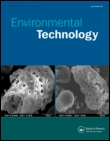
ENVIRONMENTAL TECHNOLOGY
Leading the Charge in Environmental Innovation and ResearchENVIRONMENTAL TECHNOLOGY, published by Taylor & Francis Ltd, is a prominent journal that serves as a crucial platform for disseminating pioneering research in the multifaceted fields of Environmental Science, Water Science and Technology, and Waste Management. With an impressive record spanning over three decades from 1990 to 2024, the journal holds significant rankings in various categories, including Q3 in Environmental Chemistry and Q2 in both Medicine (miscellaneous) and Water Science and Technology for 2023. Its Scopus rankings further position it within the top tiers of Environmental Science disciplines, reflecting its influence and relevance, particularly as it pertains to pressing global environmental challenges. While the journal does not offer an open access option, it remains dedicated to advancing knowledge and promoting innovative solutions among researchers, professionals, and students engaged in environmental studies. As it continues to attract high-quality submissions, ENVIRONMENTAL TECHNOLOGY plays a vital role in shaping future research and practices aimed at sustainable environmental management.

ENVIRONMENTAL ENGINEERING SCIENCE
Transforming challenges into opportunities for environmental progress.ENVIRONMENTAL ENGINEERING SCIENCE is a leading journal published by MARY ANN LIEBERT, INC that provides a platform for pioneering research in the fields of environmental chemistry, pollution control, and waste management. With an ISSN of 1092-8758 and an E-ISSN of 1557-9018, this peer-reviewed journal aims to disseminate high-quality scientific studies that address critical environmental challenges. As evidenced by its 2023 category quartile rankings, it holds a notable position at Q3 in Environmental Chemistry and Pollution and Q2 in Waste Management and Disposal, highlighting its relevance and impact in these domains. Spanning over two decades from 1997 to 2024, the journal is dedicated to fostering innovations and promoting rigorous scholarship that can contribute significantly to sustainable environmental practices globally. Authors and researchers are encouraged to engage with this essential resource, which offers Open Access options to enhance the visibility and reach of their work. For those interested in advancing their understanding and practice within the environmental sciences, ENVIRONMENTAL ENGINEERING SCIENCE is an indispensable journal to consider.
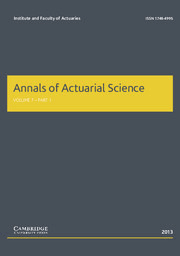
Annals of Actuarial Science
Advancing the frontiers of risk management and data analysis.Annals of Actuarial Science, published by Cambridge University Press, stands as a prominent academic journal in the fields of economics, statistics, and actuarial science. With an ISSN of 1748-4995, it features rigorous research aimed at advancing knowledge and practice in areas related to risk management, data analysis, and probability. The journal is recognized for its significant impact, holding a Q2 category ranking in both Economics and Econometrics and Statistics and Probability, along with notable positioning within Scopus rankings. Although it does not currently offer open access, its comprehensive selection of scholarly articles from 2010 to 2024 remains invaluable to researchers, professionals, and students alike, providing insights that drive the actuarial profession and enhance decision-making processes across various sectors. Positioned at the intersection of theoretical innovation and practical application, the Annals of Actuarial Science continues to shape the discourse and development of its disciplines.

Advances in Environmental Research-An International Journal
Driving Change through Scholarly DiscourseAdvances in Environmental Research is an international journal published by TECHNO-PRESS, dedicated to advancing our understanding of environmental science and sustainability. Operating with an ISSN of 2234-1722 and an E-ISSN of 2234-1730, this journal serves as a premier outlet for researchers, professionals, and students aiming to share pioneering research findings, case studies, and reviews that address contemporary environmental challenges. The journal aims to provide a platform for scholarly discussion on a wide range of topics, including pollution control, resource management, and ecological conservation. Though currently classified as a non-open access journal, it remains accessible through various institutional subscriptions, allowing a broad audience to engage with its content. Committed to fostering academic collaboration and innovation, Advances in Environmental Research plays a crucial role in informing policymakers and the scientific community about emerging trends and solutions in environmental studies, making it an essential resource for those dedicated to creating a sustainable future.
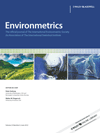
ENVIRONMETRICS
Empowering Researchers to Tackle Environmental ChallengesENVIRONMETRICS is a leading journal published by Wiley, dedicated to advancing the interdisciplinary field of environmental statistics and ecological modeling. With an ISSN of 1180-4009 and an E-ISSN of 1099-095X, this esteemed journal has been a pivotal resource for researchers and professionals since its inception in 1990, covering innovative methodologies and applications through its convergence years, which extend to 2024. Ranking in the Q2 quartile for both Ecological Modeling and Statistics and Probability in 2023, it stands among the top-tier publications in these fields. ENVIRONMETRICS boasts a robust Scopus ranking, placing it at #89 out of 278 journals in Mathematics - Statistics and Probability and at #22 out of 41 in Environmental Science - Ecological Modeling, illustrating its significance and impact within the academic community. Although it does not operate as an open-access journal, it remains a vital platform for disseminating high-quality research that addresses pressing environmental challenges, fostering collaborations among statisticians, ecologists, and policy-makers alike.
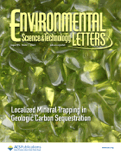
Environmental Science & Technology Letters
Pioneering research for environmental breakthroughs.Environmental Science & Technology Letters, published by the American Chemical Society, stands as a premier journal in the realm of environmental science and technology, focusing on pivotal studies that address pressing environmental challenges. With an impressive Q1 ranking in multiple categories including Ecology, Environmental Chemistry, and Pollution, this journal maintains a position of excellence within its field, achieving Scopus ranks that place it in the top percentile of Environmental Science disciplines. Although not open access, Environmental Science & Technology Letters offers vital insights and cutting-edge research that contribute significantly to the understanding and management of environmental issues. The journal’s objectives include disseminating ground-breaking findings and promoting discussions that lead to sustainable solutions. With convergence from 2013 to 2024, it continues to serve as an essential resource for researchers, professionals, and students committed to advancing knowledge and innovation in environmental science.

ENVIRONMENTAL MANAGEMENT
Empowering ecological stewardship for a better planet.ENVIRONMENTAL MANAGEMENT, published by Springer, stands at the forefront of advancing sustainability and ecological stewardship in the fields of Ecology, Global and Planetary Change, and Pollution. With an impressive tracking history from 1977 to 2024 and prestigious quartile rankings reflecting its significant impact (Q1 in Ecology and Q2 in both Global and Planetary Change and Pollution), this journal engages a wide range of stakeholders, including researchers, policymakers, and environmental professionals. The journal is a vital resource for those dedicated to addressing pressing global environmental challenges, publishing rigorous interdisciplinary research that informs policy and practice. While it does not offer open access, its content remains accessible through institutional subscriptions. Located in the heart of New York, ENVIRONMENTAL MANAGEMENT is dedicated to fostering a substantive dialogue on innovative approaches to environmental preservation and management.

Rocznik Ochrona Srodowiska
Catalyzing Sustainable Practices through Rigorous ResearchRocznik Ochrona Srodowiska, published by the Middle Pomeranian Scientific Society for Environmental Protection, is an esteemed journal dedicated to advancing the field of environmental science in Poland and beyond. With an ISSN of 1506-218X, this peer-reviewed journal has established itself as a vital resource since its inception in 2007, addressing various environmental issues and promoting sustainable practices. Currently holding a Q3 category ranking in the Environmental Science (miscellaneous) field for 2023, it places itself in the 23rd percentile of Scopus rankings, reflecting a growing influence in the broader environmental research community. While the journal is not open access, it serves as an important conduit for researchers, professionals, and students to disseminate their findings and contribute to the interdisciplinary dialogue aimed at tackling pressing environmental challenges. With a commitment to rigorous research and practical applications, Rocznik Ochrona Srodowiska remains an essential platform for fostering innovation and collaboration in environmental studies.

STOCHASTIC ENVIRONMENTAL RESEARCH AND RISK ASSESSMENT
Empowering Solutions through Cutting-edge Environmental ResearchSTOCHASTIC ENVIRONMENTAL RESEARCH AND RISK ASSESSMENT, published by Springer, stands as a pivotal resource in the field of environmental science, bridging the essence of probabilistic analysis with pressing environmental challenges. With an impact factor that underscores its Q1 rankings in multiple key categories—including Environmental Engineering and Safety, Risk, Reliability, and Quality—the journal fosters a vibrant arena for researchers, professionals, and students to explore innovative methodologies and applications. This scholarly platform, with a convergence of articles from 1999 to 2024, emphasizes the critical assessment of risks and uncertainties in environmental contexts. Notably, it offers Open Access options, ensuring a wider dissemination of groundbreaking research that paves the way for sustainable practices. Situated in the dynamic landscape of environmental chemistry and water science, the journal not only reflects current trends but also sets the stage for future advancements in risk assessment and environmental strategies.
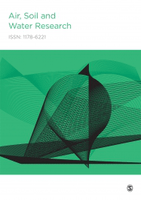
Air Soil and Water Research
Uncovering Insights for Environmental InnovationAir Soil and Water Research is a premier open access journal published by SAGE Publications Ltd, dedicated to the interdisciplinary study of environmental science. Since its inception in 2008, this journal has provided a vital platform for researchers and professionals to disseminate findings that enhance our understanding of the interconnectedness of air, soil, and water systems. With an impressive impact factor and a ranking of #43 out of 233 in the General Environmental Science category, the journal proudly occupies the Q2 quartile within its field, demonstrating its influence and contribution to environmental research. The journal's editorial board comprises leading scientists and experts committed to ensuring high-quality publications that address important environmental challenges. Accessible to all, it provides a wealth of knowledge and resources for academics, practitioners, and policymakers looking for innovative solutions to pressing ecological issues.